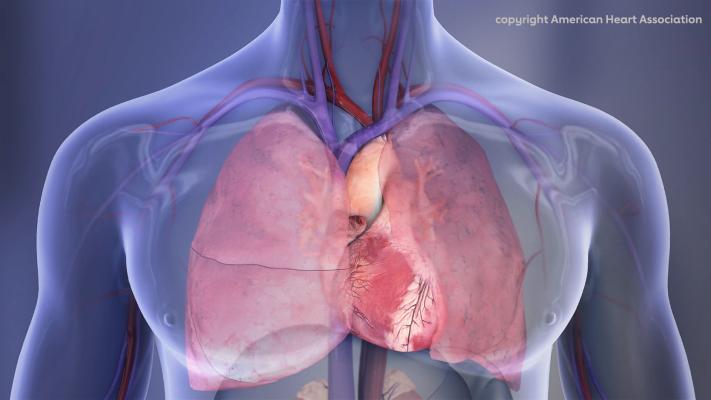
Human Chest Cavity illustration: Right lung, left lung, heart. Copyright American Heart Association
July 27, 2022 — Heart damage is common among patients hospitalized with COVID-19, leading many to wonder how the virus affects the heart. Now, researchers have found that the spike protein from the severe acute respiratory syndrome coronavirus 2 (SARS-CoV-2) virus can lead to heart muscle injury through the inflammatory process, according to preliminary research to be presented at the American Heart Association’s Basic Cardiovascular Sciences Scientific Sessions 2022. The meeting, held in Chicago on July 25-28, offers the latest research on basic and translational cardiovascular science.
The spike protein is found on the surface of SARS-CoV-2, the virus that causes COVID-19. Spike proteins latch onto receptors known as angiotensin-converting enzyme 2 (ACE2) on target cells. The spike protein facilitates virus entry into healthy cells, which is the first step in infection. In addition to infecting the lungs, the virus can also spread to other organs leading to more damage to the body, severe infection and, among some people, death.
“It’s already known from the clinical side that COVID-19 infection can induce heart injury, however, what we don’t know is the mechanistic details of how this occurs. What we suspect is that the spike protein has unknown pathological roles,” said Zhiqiang Lin, Ph.D., lead author of the study and an assistant professor at the Masonic Medical Research Institute in Utica, New York. “Our data show that the spike protein from SARS-CoV-2 causes heart muscle damage. That’s why it’s important to get vaccinated and prevent this disease.”
“Host natural immunity is the first line of defense against pathogen invasion, and heart muscle cells have their own natural immune machinery. Activation of the body’s immune response is essential for fighting against virus infection; however, this may also impair heart muscle cell function and even lead to cell death and heart failure,” Lin said.
The researchers studied whether the SARS-CoV-2 spike protein activates the natural immune response in heart muscle cells. HCoV-NL63 is a coronavirus that infects the respiratory system without causing cardiac injury, although its spike protein also uses ACE2 to mediate virus entry. They studied the potential ability to cause heart disease of both SARS-CoV-2 spike protein and the NL63 spike protein. Their results showed that the SARS-CoV-2 spike protein activated the natural immune response in heart muscle cells and damaged the heart, but the NL63 spike protein did not.
“The fact that the SARS-CoV-2 spike protein is activating the natural immune response may explain the high virulence compared to the other coronaviruses,” Lin said. “The TLR4 signaling is the major pathway that activates the body’s natural immune response, and the SARS-CoV-2 spike protein activates TLR4, not the regular flu spike protein.”
To investigate the impact of the SARS-CoV-2 spike protein on the heart, researchers cloned the SARS-CoV-2 spike protein and the NL63 spike protein into the AAV9 viral vector. The AAV9 viral vector was delivered into lab mice to activate the spike protein in the heart muscle cells. They found that the AAV9-mediated the SARS-CoV-2 spike protein, and not the NL63 spike protein, caused heart dysfunction, hypertrophic remodeling (enlargement) and cardiac inflammation.
In lab testing of heart cells cultured in dishes, researchers also observed that the SARS-CoV-2 spike protein made heart muscle cells much larger compared to cells without either spike protein. “We found direct evidence that the SARS-CoV-2 spike protein is toxic to heart muscle cells,” Lin said.
During this study, researchers also examined a heart biopsy from a deceased patient with inflammation due to COVID-19. They detected the SARS-CoV-2 spike protein and TLR4 protein in both heart muscle cells and other cell types. In contrast, these two proteins were absent in a biopsy of a healthy human heart. “That means once the heart is infected with SARS-CoV-2, it will activate the TLR4 signaling,” Lin said. “Besides directly damaging the heart muscle cells, the spike protein itself is very inflammatory and may cause systemic inflammation that indirectly causes heart problems.”
ACE2 is an important enzyme controlling blood pressure. SARS-CoV-2 infection may impair ACE2 function, which in turn leads to blood pressure increase and, thereby, injures the heart. SARS-CoV-2 may also damage the heart through other unknown pathways.
“Our study provides two pieces of evidence that the SARS-CoV-2 spike protein does not need ACE2 to injure the heart. First, we found that the SARS-CoV-2 spike protein injured the heart of lab mice. Different from ACE2 in humans, ACE2 in mice does not interact with SARS-CoV-2 spike protein, therefore, SARS-CoV-2 spike protein did not injure the heart by directly disrupting ACE2 function. Second, although both the SARS-CoV-2 and NL63 coronaviruses use ACE2 as a receptor to infect cells, only the SARS-CoV-2 spike protein interacted with TLR4 and inflamed the heart muscle cells. Therefore, our study presents a novel, ACE2-independent pathological role of the SARS-CoV-2 spike protein, ” Lin said.
This research takes the first step toward determining whether the SARS-CoV-2 spike protein affects the heart. The researchers now plan to investigate how SARS-CoV-2 spike proteins cause inflammation in the heart. There are two potential ways: the first is that spike protein is expressed in the virus-infected heart muscle cells and thereby directly activates inflammation; the second is that the virus spike protein is shed into the bloodstream, and the circulating SARS-CoV-2 spike proteins damage the heart.
For more information: https://www.heart.org/en/about-us/aha-financial-information
Related Long-COVID Content:
MRI Sheds Light on COVID Vaccine-Associated Heart Muscle Injury
What We Know About Cardiac Long-COVID Two Years Into the Pandemic
VIDEO: Long-term Cardiac Impacts of COVID-19 Two Years Into The Pandemic — Interview with Aaron Baggish, M.D.
VIDEO: Long-COVID Presentations in Cardiology at Beaumont Hospital — Interview with Justin Trivax, M.D.
VIDEO: Cardiac Presentations in COVID Long-haulers at Cedars-Sinai Hospital — Interview with Siddharth Singh, M.D.
Find more COVID news and videos
Related COVID Content:
COVID-19 Fallout May Lead to More Cancer Deaths
Kawasaki-like Inflammatory Disease Affects Children With COVID-19
FDA Adds Myocarditis Warning to COVID mRNA Vaccine Clinician Fact Sheets
CMS Now Requires COVID-19 Vaccinations for Healthcare Workers by January 4
Cardiac MRI of Myocarditis After COVID-19 Vaccination in Adolescents
Small Number of Patients Have Myocarditis-like Illness After COVID-19 Vaccination
Overview of Myocarditis Cases Caused by the COVID-19 Vaccine
Case Study Describes One of the First U.S. Cases of MIS-C
NIH-funded Project Wants to Identify Children at Risk for MIS-C From COVID-19


 November 14, 2025
November 14, 2025 









